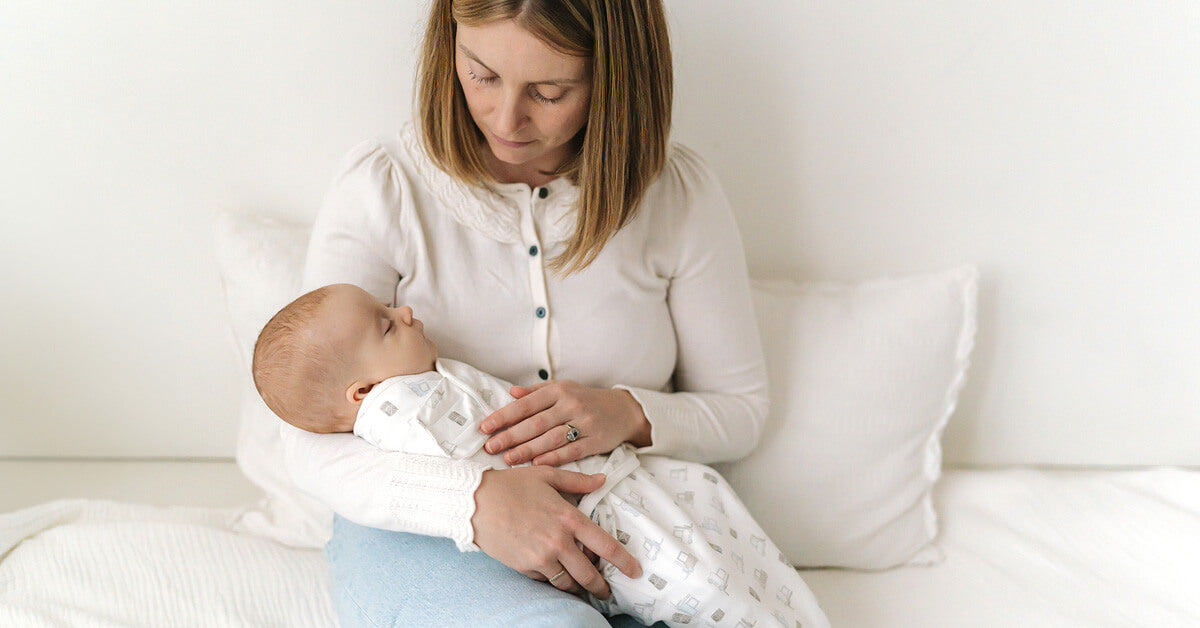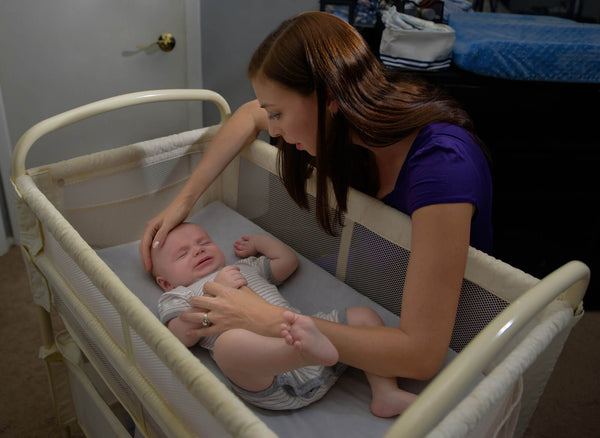
Help Your Baby's Sleep Through The Magic Of Dream Feeding
What is the benefit to dream feeding newborns? Learn how to help your baby sleep better with the dream feeding technique!
All parents, especially those of newborn babies, want their little one to sleep longer at night. But the reality is, babies wake up frequently, especially in the early weeks and months of life.
If you're exhausted from frequent night wakings, there is evidence that a technique called "dream feeding" might be the key to helping your little one get on a sleep schedule that works for you as well.
How does dream feeding work?
If you're the parent of a little one desperate for more hours of uninterrupted sleep, you might find yourself looking up dream feeding. In simple terms, dream feeding is an extra feeding session incorporated into the sleep schedule, so you can feed your baby one last time before you yourself drift off to sleep, in the hopes that they will go into a deep sleep for longer stretches.
Dream feeding sounds great in theory to many parents of young babies, but does it actually work? How does it affect bottle feeding versus breastfeeding?
Read on to learn all about how to dream feed, how to combat early waking, and how to help you little one sleep longer stretches at night.
How dream feeding helps babies sleep:
A "dream feed" is typically done several hours after you've put your baby down for the night. The goal of dream feeds is to wake the baby up enough to eat properly, but not arouse them enough that it is hard for them to fall asleep after the feeding. The semi-awake phase is what is known as the "dream feeding" state.
Night feedings are tricky for many parents. When baby wakes frequently throughout the night to eat, it is exhausting for them and for the parents. Although it might seem odd to dream feed by offering the breast or bottle when the baby has already been asleep and doesn't seem hungry, very young babies have the innate reflex to suck, and this natural rooting reflex allows babies to latch even while they're sleepy.
The idea of the dream feed is to feed your baby in a way that accommodates your own sleeping schedule. If you put your baby to sleep at 7:00pm, but you go to bed around 10:00pm, consider doing a dream feed around 9:45pm, right before you usually fall asleep. The goal is for baby to go back to sleep quickly, and sleep longer stretches throughout the night.
When you dream feed, be sure to feed baby in a good location, like a rocking chair. Hold your baby in a semi-upright position to avoid your little one getting gas.
Will a dream feed help my baby go back to sleep?
There isn't much research to back up whether dream feeding sessions actually help infants sleep better and longer at night - but many parents swear by it. This technique depends on a variety of factors, including baby's sleep during the day, how often you typically feed your baby, the age of your baby, and how often your baby awakens normally on a given night. For many babies, the dream feed can keep them full and peaceful for longer stretches of time, allowing parents to get a better night's sleep.
Although it can be frustrating to be awake during late night hours, parents need to remember that dream feeding doesn't always equate to your baby getting more sleep overall. However, when you give your baby a dream feed, it might help shift one of their night feedings to align better with your own sleep schedule.
Dream feeding also only works if the baby is waking up due to hunger. While some babies wake frequently because they are hungry, other babies wake up because they are wet, scared, or uncomfortable. Thus, feeding your baby in this scenario won't help much.
Dream feeding: what are the benefits?
Here are some pros and cons to keep in mind when you want to dream feed your baby.
Why dream feed?
Doing a dream feed can be very helpful, especially for breastfed babies. Sleep deprivation is so exhausting for parents, and adding an extra feeding session to your bedtime routines can help increase your milk supply. As long as your baby's mouth is in the correct position to latch, a dream feed can really help with nighttime sleep and signal your body to produce more milk for your little one.
A dream feed can benefit the whole family by allowing everyone to go to bed and get longer periods of sleep. Your sleep schedule probably doesn't always line with your baby's schedule, but a dream feed can help your baby go back to sleep peacefully when you want to go to sleep yourself.
Aside from benefiting infant sleep, a dream feed can act as an extra feeding to help infants put on weight. When a baby has problems gaining weight properly, a dream feed acts as an extra feeding session and might help them take in more nutrients while allowing them to get enough rest.
Tips for doing a successful dream feed:
-
Time your baby's dream feed for when they show hunger cues. This includes tossing and turning, making sucking movements with their mouth, rooting, or sucking on a pacifier or fingers.
-
Avoid your baby waking up fully during the dream feed. Keep the lights off or low.
-
Avoid distractions that will interfere with your baby's sleep schedule. Things like having music or the television playing, turning on the lights in the room, undressing baby or changing your baby's diaper, or scrolling through your phone can all make it more difficult to get baby back to sleep.
Dream feeds just don't work for some babies, so don't be discouraged if it doesn't help your baby get a longer stretch of sleep after all. If your baby wakes up fully during each dream feed, if their latch is weak, or if they spend a few nights being difficult to get back to sleep, dream feeding might not be the best option for your family.
Why shouldn't you dream feed?
The number one issue that happens with dream feeding is that the baby wakes up fully and doesn't want to go back to sleep after the dream feed. Some babies are difficult to get back to sleep once they wake up. You (and your little one) might become frustrated because you've now added an extra feeding while disrupting your little one's sleep.
A dream feed can also cause your baby not to latch properly because they are eating while they are too drowsy. An improper latch can affect bottle-fed babies and breastfed babies alike, and can cause challenges with swallowing and burping. In this case, getting your baby out of the crib or bassinet to do a dream feed might disrupt their sleep even more, because of digestive discomfort.
Another con of dream feeding is that most babies won't get a full feeding in - so it might not help babies sleep any longer after all. Whether they drink breast milk or formula, they might still wake up just as often throughout the night to eat.
When to stop dream feeding
All families should eventually wean off the dream feed. By paying attention to the sleeping and feeding patterns of your unique baby, you can gauge when it's time to drop the dream feed.
Although feeding your baby throughout the night is exhausting, it is a temporary phase of parenthood. Eventually, all babies learn to sleep longer without a dream feed. Breastfed infants tend to wake throughout the night for longer than formula fed babies - but as babies get older, they are able to sleep through the night.
Should you call a healthcare provider about your baby's sleep?
Most parents are desperate for their little ones to sleep a longer stretch at night in their crib or bassinet. Your baby's schedule will change a lot over the first few years of life. Don't fret - whether your baby is bottle fed or you're a breastfeeding mom, all babies eventually sleep longer.
Parents should always follow safe sleep guidelines as advised by the AAP. This includes putting your baby to sleep on their back, keeping the crib or bassinet free from loose blankets and toys, and keeping household dangers away from the baby's sleep space.
If you find your infant crying frequently throughout the night even when they're fed, if your baby never seems to take a full feeding at night, or dream feeds don't seem to ever make a difference in getting a longer stretch of sleep, don't hesitate to contact your child's pediatrician to discuss how to help your baby sleep better. Healthcare providers have plenty of advice for dealing with a baby's ever-changing sleep cycles.
Dream feeding might help babies sleep longer.
If you want to start dream feeding, be sure to check in with your child's pediatrician to see if it will be beneficial. A dream feed can be beneficial in many ways, including helping an infant get a longer stretch of sleep at night - which helps parents sleep better, too!
|
|
Meet Our KeaMommy Contributor: Kaitlyn Torrez I’m Kaitlyn Torrez, from the San Francisco Bay Area. I live with my husband and two children, Roman and Logan. I’m a former preschool teacher, currently enjoying being a stay at home mom. I love all things writing, coffee, and chocolate. In my free time, I enjoy reading, blogging, and working out. |






























































